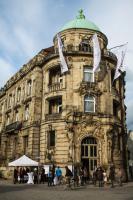 I think we always have the responsibility of looking into the ghosts of these colonial dreams and taking the ideas further. For example, we must rethink what are artwork features and what exactly defines them? Institutions change, in a slow and tedious way, but it happens. If we also think about the thesis and how it is configurated, how free can we be about the aesthetic part of it? Now we can offer “decolonize art studies” as a course. All the reconfigurations are a very long process to be achieved. A very important thing I would like to highlight is that where you are you must do your work and contribution. We should try to influence others with our work, inspiring them and trying to change what we know is wrong.
I think we always have the responsibility of looking into the ghosts of these colonial dreams and taking the ideas further. For example, we must rethink what are artwork features and what exactly defines them? Institutions change, in a slow and tedious way, but it happens. If we also think about the thesis and how it is configurated, how free can we be about the aesthetic part of it? Now we can offer “decolonize art studies” as a course. All the reconfigurations are a very long process to be achieved. A very important thing I would like to highlight is that where you are you must do your work and contribution. We should try to influence others with our work, inspiring them and trying to change what we know is wrong.
Face to face
18.03.2022 | by Arimilde Soares
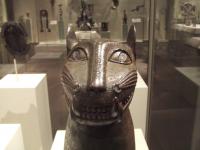 The past five years have seen a flurry of activity around issues of restitution of African material heritage, resulting in new reports, new books and even, new returns. Along with this sudden surge in activity there has been an escalation in debate around these questions, where positions once thought to be entrenched, racist, conservative, and considered mainstream, seem to have shifted dramatically. In the frenzy, it can begin to feel as if things are changing and that society is progressing. But we’d do well to pause for deeper dives and more systematic remembering of what has come before.
The past five years have seen a flurry of activity around issues of restitution of African material heritage, resulting in new reports, new books and even, new returns. Along with this sudden surge in activity there has been an escalation in debate around these questions, where positions once thought to be entrenched, racist, conservative, and considered mainstream, seem to have shifted dramatically. In the frenzy, it can begin to feel as if things are changing and that society is progressing. But we’d do well to pause for deeper dives and more systematic remembering of what has come before.
To read
28.12.2021 | by
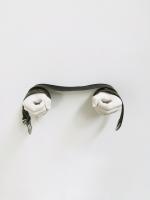 The exhibition Europa Oxalá is also the ideal time to deconstruct the colonial myth and the post-colonial melancholy designated as “African art”. Attributed to all artistic production that originates in the African continent, the expression has been used to differentiate it in a coarse way from all the art included in the compendiums and narratives of the universal history of art founded in the Western matrix. So-called African art was seen as an art without authorship, disconnected from the diversity of its production contexts, be they a country of North Africa, of the South or the east or west coast, be it the 14th or 20th century.
The exhibition Europa Oxalá is also the ideal time to deconstruct the colonial myth and the post-colonial melancholy designated as “African art”. Attributed to all artistic production that originates in the African continent, the expression has been used to differentiate it in a coarse way from all the art included in the compendiums and narratives of the universal history of art founded in the Western matrix. So-called African art was seen as an art without authorship, disconnected from the diversity of its production contexts, be they a country of North Africa, of the South or the east or west coast, be it the 14th or 20th century.
To read
18.10.2021 | by António Pinto Ribeiro
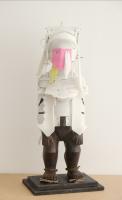 In the face of this new narrative that acknowledges artistic production and an appreciation of it by African communities, how do secular cultural traditions of African countries interact today with artistic training and production, in the case of Afrodescendant artists, who were born and raised in European countries? How do events in the history of Africa and Africans combine with the artistic languages of the "European schools" and, in particular, with contemporary themes?
In the face of this new narrative that acknowledges artistic production and an appreciation of it by African communities, how do secular cultural traditions of African countries interact today with artistic training and production, in the case of Afrodescendant artists, who were born and raised in European countries? How do events in the history of Africa and Africans combine with the artistic languages of the "European schools" and, in particular, with contemporary themes?
To read
28.12.2020 | by António Pinto Ribeiro
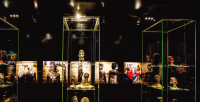 The discussion about the restitution of ethnographic works – be them artistic, documental or human remains – to the countries of origin is not new, but regained prominence two weeks ago with the announcement of Emmanuel Macron’s decision to return a bronze collection to Benin, from where the artworks were taken at the end of the 19th century in a punitive military expedition against the kingdoms of west Africa.
The discussion about the restitution of ethnographic works – be them artistic, documental or human remains – to the countries of origin is not new, but regained prominence two weeks ago with the announcement of Emmanuel Macron’s decision to return a bronze collection to Benin, from where the artworks were taken at the end of the 19th century in a punitive military expedition against the kingdoms of west Africa.
To read
29.12.2018 | by vários
 I think we always have the responsibility of looking into the ghosts of these colonial dreams and taking the ideas further. For example, we must rethink what are artwork features and what exactly defines them? Institutions change, in a slow and tedious way, but it happens. If we also think about the thesis and how it is configurated, how free can we be about the aesthetic part of it? Now we can offer “decolonize art studies” as a course. All the reconfigurations are a very long process to be achieved. A very important thing I would like to highlight is that where you are you must do your work and contribution. We should try to influence others with our work, inspiring them and trying to change what we know is wrong.
I think we always have the responsibility of looking into the ghosts of these colonial dreams and taking the ideas further. For example, we must rethink what are artwork features and what exactly defines them? Institutions change, in a slow and tedious way, but it happens. If we also think about the thesis and how it is configurated, how free can we be about the aesthetic part of it? Now we can offer “decolonize art studies” as a course. All the reconfigurations are a very long process to be achieved. A very important thing I would like to highlight is that where you are you must do your work and contribution. We should try to influence others with our work, inspiring them and trying to change what we know is wrong.  The past five years have seen a flurry of activity around issues of restitution of African material heritage, resulting in new reports, new books and even, new returns. Along with this sudden surge in activity there has been an escalation in debate around these questions, where positions once thought to be entrenched, racist, conservative, and considered mainstream, seem to have shifted dramatically. In the frenzy, it can begin to feel as if things are changing and that society is progressing. But we’d do well to pause for deeper dives and more systematic remembering of what has come before.
The past five years have seen a flurry of activity around issues of restitution of African material heritage, resulting in new reports, new books and even, new returns. Along with this sudden surge in activity there has been an escalation in debate around these questions, where positions once thought to be entrenched, racist, conservative, and considered mainstream, seem to have shifted dramatically. In the frenzy, it can begin to feel as if things are changing and that society is progressing. But we’d do well to pause for deeper dives and more systematic remembering of what has come before.  The exhibition Europa Oxalá is also the ideal time to deconstruct the colonial myth and the post-colonial melancholy designated as “African art”. Attributed to all artistic production that originates in the African continent, the expression has been used to differentiate it in a coarse way from all the art included in the compendiums and narratives of the universal history of art founded in the Western matrix. So-called African art was seen as an art without authorship, disconnected from the diversity of its production contexts, be they a country of North Africa, of the South or the east or west coast, be it the 14th or 20th century.
The exhibition Europa Oxalá is also the ideal time to deconstruct the colonial myth and the post-colonial melancholy designated as “African art”. Attributed to all artistic production that originates in the African continent, the expression has been used to differentiate it in a coarse way from all the art included in the compendiums and narratives of the universal history of art founded in the Western matrix. So-called African art was seen as an art without authorship, disconnected from the diversity of its production contexts, be they a country of North Africa, of the South or the east or west coast, be it the 14th or 20th century.  In the face of this new narrative that acknowledges artistic production and an appreciation of it by African communities, how do secular cultural traditions of African countries interact today with artistic training and production, in the case of Afrodescendant artists, who were born and raised in European countries? How do events in the history of Africa and Africans combine with the artistic languages of the "European schools" and, in particular, with contemporary themes?
In the face of this new narrative that acknowledges artistic production and an appreciation of it by African communities, how do secular cultural traditions of African countries interact today with artistic training and production, in the case of Afrodescendant artists, who were born and raised in European countries? How do events in the history of Africa and Africans combine with the artistic languages of the "European schools" and, in particular, with contemporary themes?  The discussion about the restitution of ethnographic works – be them artistic, documental or human remains – to the countries of origin is not new, but regained prominence two weeks ago with the announcement of Emmanuel Macron’s decision to return a bronze collection to Benin, from where the artworks were taken at the end of the 19th century in a punitive military expedition against the kingdoms of west Africa.
The discussion about the restitution of ethnographic works – be them artistic, documental or human remains – to the countries of origin is not new, but regained prominence two weeks ago with the announcement of Emmanuel Macron’s decision to return a bronze collection to Benin, from where the artworks were taken at the end of the 19th century in a punitive military expedition against the kingdoms of west Africa. 